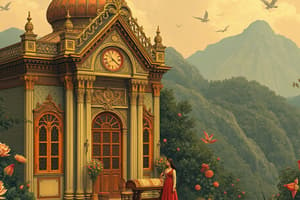Podcast
Questions and Answers
What is art or 'sining' defined as?
What is art or 'sining' defined as?
Different manners of expressing human skills and imagination in the creation of aesthetic conditions, objects, and presentations.
Art is only confined to what is seen.
Art is only confined to what is seen.
False (B)
What plays a significant role in the cultural identity of the Philippines?
What plays a significant role in the cultural identity of the Philippines?
- Sports
- Economics
- Modern technology
- Arts (correct)
Which of the following are major traditions in Philippine arts? (Select all that apply)
Which of the following are major traditions in Philippine arts? (Select all that apply)
What are the three major traditions in the development of Philippine arts?
What are the three major traditions in the development of Philippine arts?
Flashcards are hidden until you start studying
Study Notes
Definition of Art
- Art, or "Sining," encompasses expressions of human skills and imagination through aesthetic creations.
- It engages all physical senses for comprehensive appreciation beyond mere visual aspects.
Importance of Arts in the Philippines
- Arts significantly contribute to the rich cultural identity of the Philippines.
- They reflect the history, traditions, and diverse experiences of Filipino people.
Diverse Art Forms
- The Philippines hosts an array of art forms representing various regional cultures.
- Integration of these forms showcases the abundant cultural and traditional landscape of the country.
- The evolution of art in the Philippines continues into contemporary traditions.
Major Traditions in Philippine Arts
- The development of Philippine arts occurs through three main traditions:
- Ethnic Tradition: Rooted in indigenous practices and beliefs.
- Spanish Colonial Tradition: Influenced by Spanish colonial rule, merging local and European styles.
- American Colonial and Contemporary Arts Traditions: Introduced new ideas and techniques, shaping modern artistic expressions.
Notable Artistic Representations
- "Langit, Lupa, at Impyerno": Represents the spiritual realm, humanity's existence, and moral consequences.
- "Crucifixion of Christ": Highlights themes of sacrifice and redemption.
- "Earthly world with Adam and Eve": Illustrates fundamental human narratives within the context of morality and existence.
Key Artistic Elements
- Core elements of visual arts include:
- Value: The lightness or darkness of hues.
- Texture: The perceived surface quality of art.
- Harmony: The pleasing arrangement of parts within the artwork.
- Variety: The use of different elements to create interest.
- Proportion: The relationship of sizes between components.
- Movement: The suggestion of action or direction in art.
- Rhythm: A visual tempo established through repeating elements.
- Balance: The distribution of visual weight across the artwork.
- Emphasis: The focal point that draws attention in the composition.
Studying That Suits You
Use AI to generate personalized quizzes and flashcards to suit your learning preferences.




